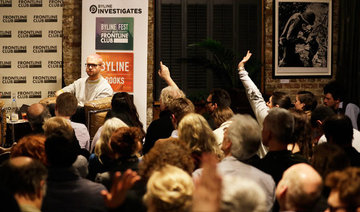SAN FRANCISCO: Big Internet companies and small software developers alike are likely to face scrutiny over how they share customer information in the wake of the scandal involving Facebook and the British election consulting firm Cambridge Analytica.
Lawmakers in the US and the EU have called for probes into how Facebook allowed Cambridge Analytica to access data on 50 million users and use it to help the election campaign of President Donald Trump. Facebook shares have fallen 8.5 percent this week as investors fear the incident will lead to new regulation.
The scrutiny and the risk of regulatory action could affect Alphabet Inc’s Google, Twitter Inc, Uber Technologies Inc, Microsoft Corp’s LinkedIn and the many others that make their user data available to outside developers.
The interconnections between platforms such as Facebook and Google and third-party services sit at the core of the contemporary Internet, enabling people to share articles to Facebook from news websites and log into shopping apps using their Google account.
But the Facebook case has turned the application programming interfaces, or APIs, that enable such data sharing, into a new front in the escalating battle between lawmakers and tech companies over the monitoring and securing of their vast platforms. Threat of sanctions has already prodded companies into better policing of inappropriate commentary on their services.
“All companies are going to need to do a lot more than just laissez faire policy to manage third-party data access,” said Jason Costa, who helped run APIs at Pinterest Inc, Twitter and Google and now works at GGV Capital. “The days of (the) ‘we’re just a platform and can’t be held responsible for how users use it’ line that many companies use, is no longer going to be tenable.”
APIs have raised privacy concerns since they emerged around 2005, but their adoption and impact has grown rapidly as companies move data online and look for ways to make it more useful.
Uber, for example, in 2016 enabled apps that provided tax and lending services to import driver paystubs. The company failed to respond to a request for comment on its monitoring and auditing practices.
The economic dynamic behind APIs is simple: Software developers create new tools that benefit big tech companies’ users, and in return they gain instant access to a large number of consumers.
The big platforms say they have built in protection, such as human reviews and automated scanning tools to detect abuse by partners.
But software experts say policies are toothless because auditing is lax; Facebook CEO Mark Zuckerberg, under intense public pressure, said on Wednesday the company would now perform audits of the information it shared with partners before it tightened rules in 2014.
Dartmouth University engineering professor Geoffrey Parker, who has assigned students to develop apps based on APIs, said automated policing methods will detect spam-like apps and brazen efforts to steal data. It is much more difficult to enforce bans on storing or mashing together information, or acting against users’ interest, he said.
Some companies added safeguards in the past several years. Facebook stopped allowing developers access to information on its users’ friends. But compliance audits were minimal, a former employee said on the condition of anonymity.
Twitter and LinkedIn limited free public access. For paid deals, LinkedIn said “partners are rigorously vetted and regularly declined.” The company added that it regularly monitors API usage and takes “swift action when we see or hear of any abuse of our terms.”
Software developers acknowledged they often do not even read the terms of use for APIs. Rule-breakers can fly under the radar and amass significant information, said Andres Blank, chief executive of recruiting software maker Scout.
“It is hard to police if the alarms aren’t being sounded,” said Blank, who has worked with APIs from LinkedIn and Google. Alex Moore, chief executive of Baydin Inc, which develops Boomerang, an app that can send emails on time-delay, said Microsoft scrutinized his services when the companies partnered on a new feature. But he was not aware of any auditing after it launched. Google recently asked whether Boomerang could access less information, but that was a rare “poke,” Moore said.
“There is going to be things people took for granted about data sharing that come to light,” he warned. Google declined to comment. Microsoft did not respond to a request to comment.
Clamping down could limit the supply of innovative tools built on data sharing. But some providers, including Royal Bank of Canada, which announced an API this week, have gone a step further to allow access only to vetted partners.
Paul Nerger, senior vice president at Developerprogram.com, which helps companies such as Cisco Systems Inc. manage APIs, said clients have limited the number of partners so that software can be tested “to make sure they are not illegally harvesting” data.
Startups are taking heed, too. Affectiva, which last year released an API for identifying consumers’ emotional states from speech samples, said that it would audit partners as its program grows. However, Gabi Zijderveld, the company’s chief marketing officer and head of product strategy, said: “We inevitably need regulation and legislation on ethical and transparent use of data.”
Data privacy alarm bells sound in wake of Facebook/Cambridge Analytica scandal
Data privacy alarm bells sound in wake of Facebook/Cambridge Analytica scandal

Egypt’s non-oil exports rise 17% as trade deficit narrows

RIYADH: Egyptian non-oil exports increased by over 17 percent year on year in 2025, reaching approximately $48.6 billion, new figures showed.
Latest foreign trade indicators released by the country’s Ministry of Investment and Foreign Trade revealed the trade deficit narrowed by 9 percent over the 12 months, reaching around $34.4 billion, according to a statement.
This supports Egypt’s ambition to enter the global top 50 in trade performance, boost exports to $145 billion a year, and narrow the trade deficit.
It also aligns with the country’s efforts to streamline procedures, maximize the benefits of trade agreements, and protect local industry in line with international agreements.
The newly released data said: “Egyptian gold exports also saw a substantial increase, reaching $7.6 billion in 2025 compared to $3.2 billion in 2024, an increase of $4.4 billion.”
It further indicated that the largest markets for Egyptian non-oil exports in 2025 included the UAE, Turkiye, and Saudi Arabia, as well as Italy and the US.
The most important export sectors included building materials at $14.9 billion, chemicals and fertilizers at $9.4 billion, and food industries at $6.8 billion.
In October, Egypt’s credit rating was raised by S&P Global to “B” from “B-,” while Fitch reaffirmed its “B” rating, citing reform progress and macroeconomic stability.
S&P said at the time that the upgrade reflects reforms implemented over the past period by the country, including the liberalization of the foreign exchange regime, which boosted competitiveness and fueled a rebound in growth.
Prime Minister Mostafa Madbouly also said at that time that both rating agencies’ decisions signal confidence in the government’s reform agenda and its expected returns.
In September, Egypt’s Ministry of Planning, Economic Development and International Cooperation reported that the economy expanded 4.4 percent in fiscal year 2024/25, driven by a strong fourth quarter when gross domestic product growth hit a three-year high of 5 percent.
This reflects the impact of the more flexible exchange rate regime adopted since March 2024, which has helped stabilize the balance of payments and restore investor confidence.













